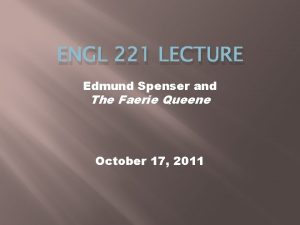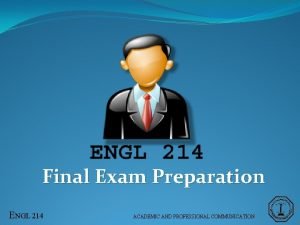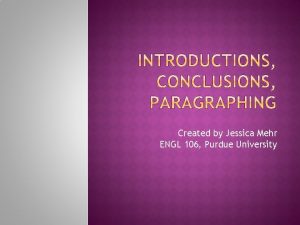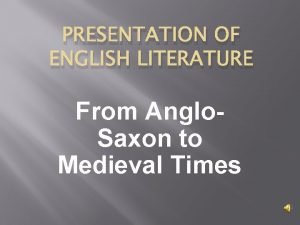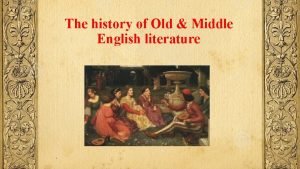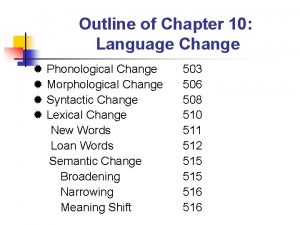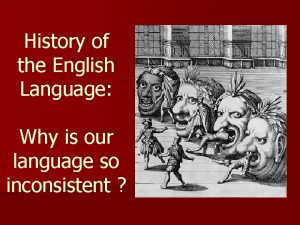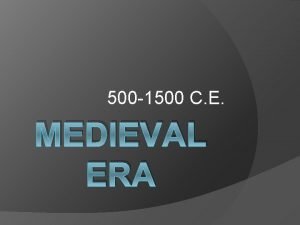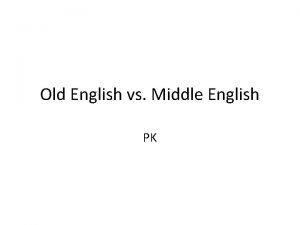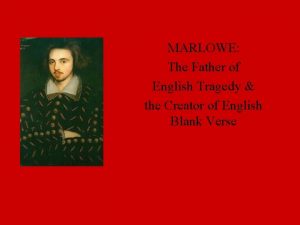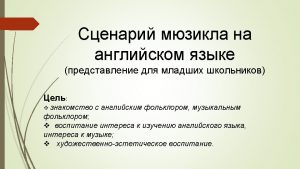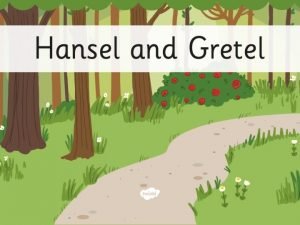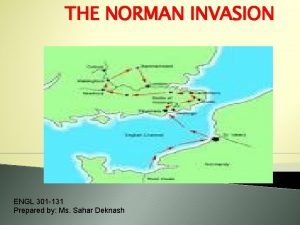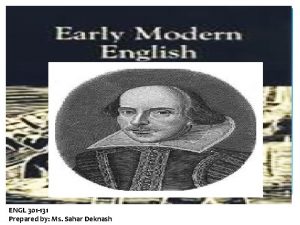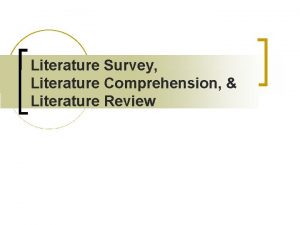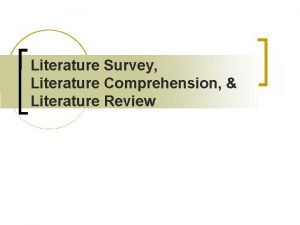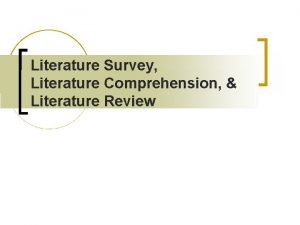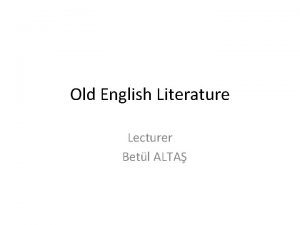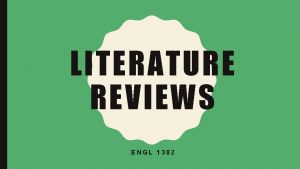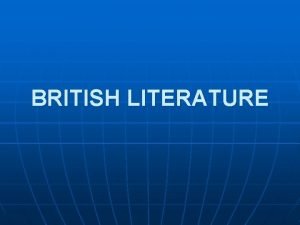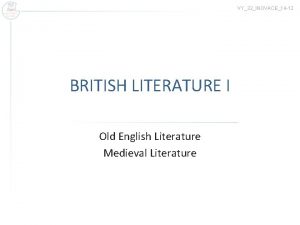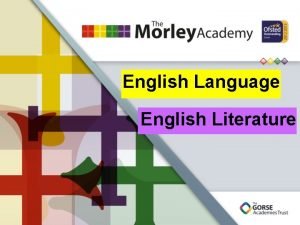THE LITERATURE OF OLD ENGLISH ENGL 301 131















- Slides: 15

THE LITERATURE OF OLD ENGLISH ENGL 301 -131 Prepared by: Ms. Sahar Deknash

v Literature is important for any language, because it keeps and protect that language. The language displays its full power in literature. The literature of the Anglo-Saxons is one of the richest and the most significant literatures that preserved some characteristics of the Anglo-Saxons' life and language. Old English literature is divided into two main parts:

v Pagan Literature v The literature which the Anglo Saxons brought with them from their homelands. v b. It was preserved for a time in oral tradition. v c. The subjects of their Literature was about ideas v like war, exile, sea and its hardships, the ruined v cities and minstrel life.

v c. examples of literary works of this type: v The wanderer, The Seafarer, The Ruin, The Battle v Of Malden v d. The most important work is Beowulf, an epic of 3000 lines written by unknown author. It describes the heroic adventures of a great warrior with the monster Grendel. It dealt with a fanciful idea and full of superstitious elements.

v Christian Literature v a. It began when the Anglo-Saxons converted to Christianity at the end of the 6 th century. v b. It is concerned with the Christian subjects, themes, and translations of the Old and New Testaments and the legends of the saints.

v c. The famous poets who belong to this type are Caedmon and Cynewulf who wrote poems like: Juliana and Elena (story of the two saints), Christ, and The Fates of the Apostles.

v Poetry was more effective and common in OE because it was easier to be memorized and orally transmitted. v According to Prose, although it was developed in Europe because of the translation of many Latin books , prose came late in OE literature. The development of OE prose is due to the efforts of King Alfred The Great.

THE STORY OF BEOWULF Why Study Beowulf? v Beowulf is the oldest poem in the English language, so everything written since Beowulf stems from it in some way. The story of Beowulf contains common themes that we still see in English literature today. To sum up, it is a great story. General Characteristics: * We don’t know who wrote it. * We don’t know when exactly it was written. * We don’t know how much, exactly, is based on historical truth.

* It was passed orally. * There a lot of Christian references in the poem, but the characters and setting are Pagan…this means a monk probably translated it. * Beowulf is an epic poem. This means it is a heroic story and the conflict is of universal importance.

SETTING: BEOWULF’S TIME AND PLACE

THEMES AND IMPORTANT ASPECTS v The conflict between Good & Evil v The importance of wealth and treasure v The importance of the sea and sailing v Fate v Loyalty to the king. v Heroism and heroic deeds v The king’s rewards to his worriers’ loyalty

KING ALFRED THE GREAT v ( The Founder of English Prose) v Alfred is described as the greatest king England has ever known and served in that capacity from 871 until his death the 26 th of October 901 He was a great leader and statesman, who defeated the Vikings. He was not only an arm man, but also an intellectual figure who believed in his nation's abilities. Victories against the Danes were not the only achievements of King Alfred. He was also instrumental in the fields of education, as he believed, education "makes life more rewarding and enjoyable; . . . the worst thing of all is ignorance".

KING ALFRED THE GREAT v He initiated the Anglo Saxon Chronicles that preserved the history of the Anglo Saxons in Britain, an important and instrumental work which is a standard in historical works of Britain. He brought in teachers from Wales and Europe and had several works translated into the Saxon language. He established schools within his kingdom. He personally translated some works from Latin into his native Saxon language. It is said that he established the first university at Oxford. He was noted for his achievements in establishing a code of law to the British kingdom according to the Bible.

KING ALFRED THE GREAT v Alfred was a patron to the arts and was responsible for teaching his workers in the fine art of metalwork of all kinds. He encouraged his people to build better homes using new mechanical inventions. He was generous in his giving of alms both to his own peoples as well as to foreigners. He is also known as the Father of the English Navy, as he was the first king to institute a fleet of ships for defense purposes. Alfred personally led his fleet to many victories against the Danes in eastern Britain. King Alfred was able to look beyond his own glory to the future of the people of Britain and provide for them a golden age which rose from the despair of 877 when the Danes threatened to destroy all that the Anglo Saxons had built. He was indeed worthy of the title, "Alfred the Great".

Thank You
 Edmund engl
Edmund engl Engl 5440u study guide
Engl 5440u study guide Professional communication final exam
Professional communication final exam Jessica mehr
Jessica mehr Anglo saxon presentation
Anglo saxon presentation Anglo saxon characteristics
Anglo saxon characteristics The old english period 450 to 1066
The old english period 450 to 1066 Semantic change
Semantic change Old english vs modern english
Old english vs modern english Old english vs modern english
Old english vs modern english Old pronouns
Old pronouns Who is the father of english drama
Who is the father of english drama What's your name is
What's your name is Once upon a little man running
Once upon a little man running Once upon a time there lived an old man and an old woman
Once upon a time there lived an old man and an old woman Once upon a time there lived a father
Once upon a time there lived a father
